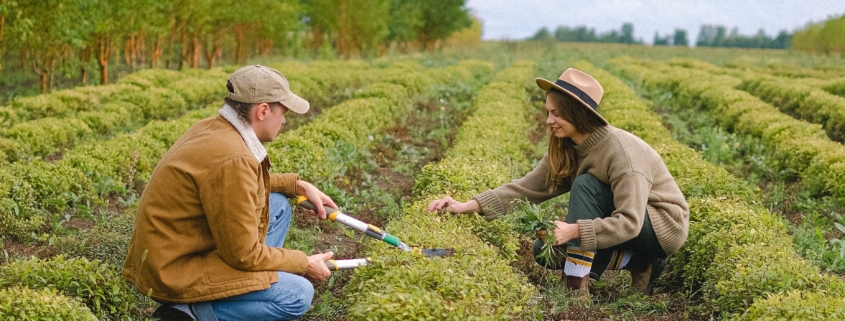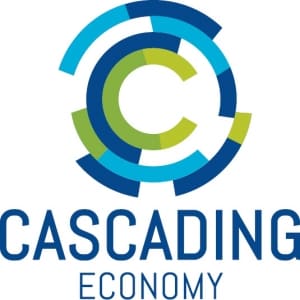
Regional development management for more sustainable food with the model of solidarity-based agriculture
Background
It has become more and more normal to buy food produced in other countries here in Germany. On the one hand, these are products that are not indigenous here, but on the other hand, they are products that could also be produced here but are nevertheless imported for economic or seasonal reasons.
In Germany, the degree of self-sufficiency (=”What percentage of the required agricultural products are produced in the own country” (1)) is quite high (89% in 2019), but still varies strongly among the different food groups: While the production of pork, potatoes, milk or sugar exceeds 100% of the self-sufficiency level and forces Germany to export, only 37% of the required vegetables and only 22% of the required fruits are produced in Germany itself. Especially for the healthiest foods, Germany has a high dependency on imports (2).
This dependence is not the only disadvantage that develops as a result of imports on this scale. Production abroad leads to a decline in local jobs in the food production industry. In addition, borderline, precarious working conditions must also be expected in production abroad, especially outside the EU. Child labor, for example, is still present in production in many countries (3). But even in Spain or Italy, refugees without protection status are often merely housed in tents, spray pesticides without protective clothing and perform heavy physical work without medical care (4).
In addition, the products often have to be transported long distances. This further drives up the climate crisis due to the CO2 emissions of the means of transport. For comparison, one kilogram of local apples from seasonal production releases about 0.3 kg of CO2-eq, while one kilogram of apples from New Zealand releases 0.8 kg of CO2-eq (5). The outsourcing of production also means that we have to comply with the production standards of other countries in terms of pesticides or fertilizers, which are not only harmful to the environment but also our health (6).
Countries that produce our vegetables and fruits have to bear the resulting social and environmental externalities alone. An example of this is Spain, one of Germany’s most important tomato suppliers. Spanish tomato production consumes 71 million m³ of water annually, 19.7 million m³ of which is used only for German consumption (7). This leads Spain to the partly illegal use of the already overstrained groundwater (8), a disaster for the environment and local people. For comparison: a tomato from southern Spain needs 20 liters of water to grow – a tomato from Germany only 3 liters (9). Social and ecological externalities are borne by the places of production and the people living there and are usually not compensated by any company: our consumption creates problems all over the world that we neither solve nor compensate financially.
More favorable production conditions in other countries influence global prices and increase competition. Consumers have become accustomed to low prices and a supply that is no longer oriented to the seasons. This puts local farmers in increasingly difficult economic situations: In some years, German farmers lose 35% of their income compared to the previous year (10), making investments unplannable for farms. In addition, the unpredictable weather conditions cause more and more problems in cultivation, which again aggravates the conditions of the farms: “The German Farmers’ Association (DBV) expects a disappointing harvest again this year.” (11)
Another consequence of distant food production is that people no longer have a connection to production and thus to the problems that are part of food production. A lot of knowledge about cultivation and food in general, but especially about local crops, is lost. In addition, consumers’ appreciation of food is also declining. Just under 80% of the people in Germany live in cities (12). For these people, an offer must be created that can provide local, seasonal, healthy, and sustainable food; at the same time, our regional farms must be supported.
Innovation & potential
BE Solutions sees a high potential in the model of solidarity farming, also called “Solawi”. The essential principles of solidarity farming are community and sharing: Food, labor, costs, responsibilities, risks, and decisions are shared by a group of people (13). A solawi can be started by a farm that is building a community as well as by a community that is looking for a farm with which to implement the solawi. The principle of the Solawi is not truly an innovation in that sense, but a rediscovery: for centuries the supply of a group by a farm was normality. Only since industrialization and the new urban living space for a large part of the population have these principles been replaced by an open market (14).
How does a solawi work today? There is no clear answer to this question because each Solawi organizes itself internally in the community and adapts the course of the joint project to the respective needs. But one thing is certain: In a solawi you finance together, you enjoy together – and all of that regionally.
The yields no longer take the usual sales route via the market, are not exported, and are only consumed regionally. As a management consultancy with a focus on sustainable and functional strategies, we see great benefits and promising potential for the local economy, the environment, and the people.
Economic security is created for local farms, as they can protect themselves regardless of market price fluctuations and other unpredictable events (such as the pandemic, for example): The secure support of the community builds a reliable future framework for the farm. The binding dimension of a solawi membership makes any investment sustainable. In this way, a farm can plan more easily and also more diversely – because it only has to meet the needs of the community and not those of the market or a few large buyers. A solawi thus frees itself from today’s economic constraints (15) and can develop more freely and diversely. Whole neighborhoods in cities or more rural regions can benefit from food sovereignty. Additionally, produce is healthier because it is harvested and consumed ripe and full of nutrients. Short transportation also significantly reduces the carbon footprint of the food – an important step against the climate crisis and for our environment. Seasonal vegetable growing also uses less energy, and diverse and varied cultivation of different crops is beneficial for the farmland and healthy, humus-rich soil. Especially on smaller, environmentally conscious farms, attention is also often paid to minimizing the use of pesticides – solawi members can also commit in this respect. This leads to a generally positive impact on the health of soils, waters, ecosystems, and that of humans and animals (15).
As a global society, everyone benefits from a local, seasonal diet. When you live off a solawi, you don’t live at the expense of other countries’ environmental or social externalities. In addition, the members of a solawi are reintroduced to the production of food. The higher value placed on the produce also helps to ensure that less food is discarded. In a society that wastes about 1/3 of its food during a climate crisis (16), a rethinking of food consumption is of enormous importance. Also about the principle of solidarity: as a society, we have to learn again to pull together on a global, but also on a regional and local level. A solawi farm can be the framework in which this becomes possible, while at the same time the local economy (and region) is sustainably supported financially, ecologically, and socially.
Best Practice
The urban farm StadtFarm, part of the BE group of companies, is adapting its concept: For a sustainable Solidarity Farming! The StadtFarm will be able to accommodate and supply up to 150 members. Together with the members, all arising questions regarding the harvest shares, the logistical organization, and the planning of the vegetables were discussed in a first meeting. Each member can look forward to a weekly harvest share, which can be collected at arranged times or delivered to their home for an additional charge. Each month, each member is provided with a seasonal vegetable share of about 15 kg from cultivation in the circular economy. This can even be enough for a small family!
You might also be interested in: Water management – agricultural runoff
Sources
- https://de-statista-com.revproxy.escpeurope.eu/statistik/daten/studie/76634/umfrage/selbstversorgungsgrad-mit-gemuese-in-deutschland/
- https://de-statista-com.revproxy.escpeurope.eu/statistik/daten/studie/1230544/survey/self-sufficiency-in-selected-agricultural-products-in-germany/
- https://www.globalagriculture.org/whats-new/news/en/33714.html
- https://www.daserste.de/information/reportage-dokumentation/dokus/sendung/europas-dreckige-ernte-114.html
- https://www.ifeu.de/fileadmin/uploads/Reinhardt-Gaertner-Wagner-2020-Oekologische-Fu%c3%9fabdruecke-von-Lebensmitteln-und-Gerichten-in-Deutschland-ifeu-2020.pdf
- https://www.greenpeace.de/themen/landwirtschaft/pestizide-machen-krank#:~:text=Special%20friendly%C3%A4hrlich%20f%C3%BCr%20Verbraucher%20sind,the%20Immune%20system%20beeintrtr%C3%A4chtigen%2C%20Allergien%20auslausl%C3%B6sen.
- https://waterfootprint.org/media/downloads/Chapagain-and-Orr-2009_1.pdf
- https://www.wwf.de/fileadmin/fm-wwf/Publikationen-PDF/Wasserrisiko_Fallbeispiel_Tomaten_aus_Spanien.pdf
- https://www.zdf.de/nachrichten/heute/oekobilanz-der-spanischen-tomate-100.html
- https://www.faz.net/aktuell/wirtschaft/deutsche-landwirte-haben-mehr-als-ein-drittel-ihrer-einkommen-verloren-13955479.html
- https://www.zeit.de/zustimmung?url=https%3A%2F%2Fwww.zeit.de%2Fwirtschaft%2F2021-08%2Fdbv-ernte-rueckgang-landwirtschaft-getreide,
- https://de.statista.com/statistik/daten/studie/662560/umfrage/urbanisierung-in-deutschland/
- https://www.solidarische-landwirtschaft.org/solawis-aufbauen/aufbau-einer-solawi
- http://urbanagriculturebasel.ch/wp-content/uploads/2015/09/Urban-Agriculture_Solidarische-Landwirtschaft-eine-soziale-Innovation_Forschungs-Abschlussbericht_SoLawi_final_mit-CC-Lizenz.pdf
- https://www.solidarische-landwirtschaft.org/fileadmin/media/solidarische-landwirtschaft.org/Sonstiges/Handbuch_Solidarhoefe.pdf
- https://www.welthungerhilfe.de/lebensmittelverschwendung


